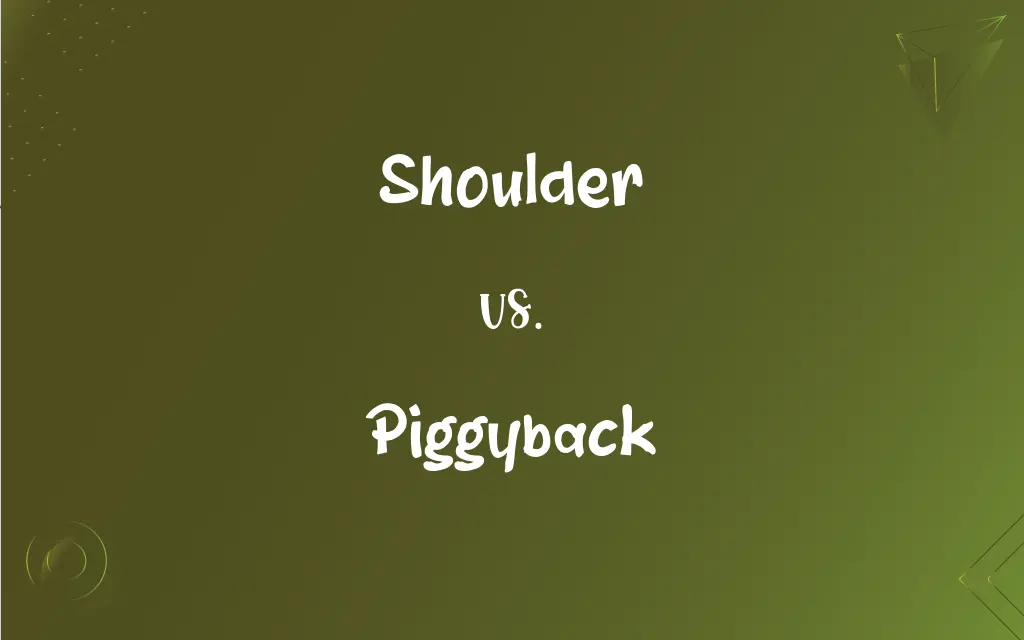Shoulder vs. Piggyback: What's the Difference?
By Janet White & Harlon Moss || Updated on May 23, 2024
Shoulder refers to carrying something on one's shoulder, while piggyback involves carrying someone on one's back with their legs wrapped around the carrier's waist.

Key Differences
Shoulder carrying involves placing an object or person on one's shoulder, often to distribute weight evenly and provide stability. This method is commonly used for heavy items like bags or small children. Piggyback carrying, on the other hand, involves someone riding on another person's back, with their legs around the carrier's waist and arms around their neck, which is often used for fun or convenience.
Shoulder carrying allows the carrier to have one hand free, providing some flexibility in movement. This technique is frequently used by laborers or parents carrying children. Piggyback carrying requires both hands to support the rider, which can be less convenient but is often used in playful contexts or when the rider is unable to walk long distances.
When carrying on the shoulder, the weight is distributed across the shoulder and back, which can be more ergonomic for heavy loads. Piggyback carrying distributes the weight along the carrier's back and legs, which can be more straining over time but allows the carrier to move more freely without obstruction from the carried person.
Shoulder carrying is typically more suitable for inanimate objects or stable loads, while piggyback carrying is specifically designed for carrying people, particularly children or those needing assistance.
Comparison Chart
Definition
Carrying on one's shoulder
Carrying someone on one's back
ADVERTISEMENT
Use
For heavy items or small children
For carrying people, often children
Hand Usage
One hand free
Both hands needed
Weight Distribution
Across shoulder and back
Along back and legs
Typical Context
Labor, transport, stability
Fun, convenience, assistance
Shoulder and Piggyback Definitions
Shoulder
Part of the body between the neck and the upper arm.
He injured his shoulder while lifting weights.
ADVERTISEMENT
Piggyback
To use something already existing.
The new software piggybacks on the existing infrastructure.
Shoulder
To take on a burden or responsibility.
He shouldered the responsibility of leading the project.
Piggyback
To connect devices in sequence.
The computers were piggybacked for data transfer.
Shoulder
Part of a road adjacent to the travel lane.
He pulled over to the shoulder to check the engine.
Piggyback
A method of transport involving riding on someone’s back.
She enjoyed the piggyback ride from her older brother.
Shoulder
To push or force with the shoulder.
He shouldered his way through the crowd.
Piggyback
On the shoulders or back
Ride piggyback.
A piggyback ride.
Shoulder
The joint connecting the arm with the torso.
Piggyback
By or relating to a method of transportation in which truck trailers are carried on trains, or cars on specially designed trucks.
Shoulder
The part of the human body between the neck and upper arm.
Piggyback
In connection with something larger or more important
A tariff provision that came piggyback with the tax bill.
A piggyback provision to a new piece of legislation.
Shoulder
The joint of a vertebrate animal that connects the forelimb to the trunk.
Piggyback
The act of transporting piggyback.
Shoulder
The part of an animal near this joint.
Piggyback
To cause to be aligned with an issue, for example, that is larger or more important
"a $21.5-million federal grant to piggyback city and state subsidies" (New York).
Shoulder
Often shoulders The area of the back from one shoulder to the other.
Piggyback
To function as if carried on the back of another
"This reagent will piggyback onto an enzyme" (Seth Rolbein).
Shoulder
A cut of meat including the joint of the foreleg and adjacent parts.
Piggyback
On somebody's back or shoulders.
Give someone a piggyback ride
Shoulder
The portion of a garment that covers the shoulder.
Piggyback
Pertaining to transportation of goods where one transportation unit is carried on the back of something else. For example, a truck on a train.
Shoulder
The angle between the face and flank of a bastion in a fortification.
Piggyback
Attached or appended to something larger or more important.
Piggyback legislation
Shoulder
The area between the body and neck of a bottle or vase.
Piggyback
On somebody's back or shoulders.
To ride piggyback
Shoulder
The end surface of a board from which a tenon projects.
Piggyback
(transitive) To carry (someone) on the back or shoulders.
Shoulder
(Printing) The flat surface on the body of type that extends beyond the letter or character.
Piggyback
(ambitransitive) To attach or append something to another (usually larger) object or event.
They tried to piggyback that proposal on the rivers and harbors bill.
Shoulder
The edge or border running on either side of a roadway.
Piggyback
To obtain a wireless internet connection by bringing one's own computer within the range of another's wireless connection without that subscriber's permission or knowledge.
Shoulder
To carry or place (a burden, for example) on a shoulder or on the shoulders.
Piggyback
To utilize "last-mile" wiring rented from a larger owner ISP by a smaller ISP.
Shoulder
To take on; assume
Shouldered the blame for his friends.
Piggyback
(transitive) To transport (a lorry/truck) on a flatbed railway waggon
Shoulder
To push or apply force to with a shoulder
Shouldered the dresser against the wall.
Piggyback
(transitive) To enter a secured area at the same time along with someone having authorized access; to tailgate
Shoulder
To make (one's way) by shoving one's shoulders.
Piggyback
(countable) A ride on somebody's back or shoulders.
Shoulder
To push with a shoulder.
Piggyback
An act or instance of piggybacking.
Shoulder
To make one's way by shoving one's shoulders.
Piggyback
The connection of one intravenous drip to another.
Shoulder
The part of an animal's body between the base of the neck and forearm socket.
Piggyback
Ride on someone's shoulders or back
Shoulder
The part of the human torso forming a relatively horizontal surface running away from the neck.
The parrot was sitting on Steve's shoulder.
Piggyback
Haul truck trailers loaded with commodities on railroad cars
Shoulder
(anatomy) The joint between the arm and the torso, sometimes including the surrounding muscles, tendons, and ligaments.
Piggyback
Haul by railroad car
Shoulder
A cut of meat comprising the upper joint of the foreleg and the surrounding muscle.
Piggyback
Carry on the back or shoulders;
She piggybacked a sick classmate to school
Shoulder
The portion of a garment where the shoulder is clothed.
Piggyback
Support on the back and shoulders;
He piggybacked her child so she could see the show
Shoulder
Anything forming a shape resembling a human shoulder.
Piggyback
On a railroad flatcar;
The trailer rode piggyback across the country
Shoulder
(topography) A shelf between two levels.
Piggyback
On the back or shoulder or astraddle on the hip;
She carried her child piggyback
Shoulder
A usually unsealed strip of land bordering a road, where vehicles can drive or park in an emergency.
He stopped the car on the shoulder of the highway to change the flat tire.
Piggyback
To carry on one's back.
He gave his daughter a piggyback ride around the park.
Shoulder
The portion of a hill or mountain just below the peak.
Piggyback
To add something as an extra.
They piggybacked a new clause onto the contract.
Shoulder
A lateral protrusion of a hill or mountain.
Shoulder
The angle of a bastion included between the face and flank.
Shoulder
An abrupt projection which forms an abutment on an object, or limits motion, etc., such as the projection around a tenon at the end of a piece of timber.
Shoulder
(printing) The flat portion of type that is below the bevelled portion that joins up with the face.
Shoulder
(of an object) The portion between the neck and the body.
Shoulder
(music) The rounded portion of a stringed instrument where the neck joins the body.
Shoulder
The rounded portion of a bottle where the neck meets the body.
Shoulder
(firearms) The angled section between the neck and the main body of a cartridge.
Shoulder
(figurative) That which supports or sustains; support.
Shoulder
The part of a key between the cuts and the bow.Parts of a Yale lock-type key
Shoulder
(surfing) The part of a wave that has not yet broken.
Shoulder
(aviation) A season or a time of day when there is relatively little air traffic.
Noon balloon
Shoulder
(transitive) To push (a person or thing) using one's shoulder.
Shoulder
(transitive) To put (something) on one's shoulders.
Shoulder
(transitive) To place (something) against one's shoulders.
Shoulder
To bear a burden, as a financial obligation.
Shoulder
To accept responsibility for.
Shoulder the blame
Shoulder
(transitive) To form a shape resembling a shoulder.
Shoulder
(intransitive) To move by or as if by using one's shoulders.
Shoulder
(transitive) To round and slightly raise the top edges of slate shingles so that they form a tighter fit at the lower edge and can be swung aside to expose the nail.
Shoulder
(intransitive) To slope downwards from the crest and whitewater portion of a wave.
Shoulder
Of a servant: to embezzle money from (the employer).
Shoulder
The joint, or the region of the joint, by which the fore limb is connected with the body or with the shoulder girdle; the projection formed by the bones and muscles about that joint.
Shoulder
The flesh and muscles connected with the shoulder joint; the upper part of the back; that part of the human frame on which it is most easy to carry a heavy burden; - often used in the plural.
Then by main force pulled up, and on his shoulders boreThe gates of Azza.
Adown her shoulders fell her length of hair.
Shoulder
Fig.: That which supports or sustains; support.
In thy shoulder do I build my seat.
Shoulder
That which resembles a human shoulder, as any protuberance or projection from the body of a thing.
The north western shoulder of the mountain.
Shoulder
The upper joint of the fore leg and adjacent parts of an animal, dressed for market; as, a shoulder of mutton.
Shoulder
The angle of a bastion included between the face and flank. See Illust. of Bastion.
Shoulder
An abrupt projection which forms an abutment on an object, or limits motion, etc., as the projection around a tenon at the end of a piece of timber, the part of the top of a type which projects beyond the base of the raised character, etc.
Shoulder
To push or thrust with the shoulder; to push with violence; to jostle.
As they the earth would shoulder from her seat.
Around her numberless the rabble flowed,Shouldering each other, crowding for a view.
Shoulder
To take upon the shoulder or shoulders; as, to shoulder a basket; hence, to assume the burden or responsibility of; as, to shoulder blame; to shoulder a debt.
As if HerculesOr burly Atlas shouldered up their state.
Shoulder
To push with the shoulder; to make one's way, as through a crowd, by using the shoulders; to move swaying the shoulders from side to side.
A yoke of the great sulky white bullocks . . . came shouldering along together.
Shoulder
The part of the body between the neck and the upper arm
Shoulder
A cut of beef from the shoulder of the animal
Shoulder
A ball-and-socket joint between the head of the humerus and a cavity of the scapula
Shoulder
Narrow edge of land (usually unpaved) along the side of a road
Shoulder
Lift onto one's shoulders
Shoulder
Push with the shoulders;
He shouldered his way into the crowd
Shoulder
Carry a burden, either real or metaphoric;
Shoulder the burden
Shoulder
To carry on one's shoulder.
She shouldered the heavy bag and walked home.
FAQs
What does shoulder carrying involve?
Shoulder carrying involves placing an item or person on one's shoulder.
When is piggyback carrying typically used?
Piggyback carrying is often used for fun, convenience, or assisting someone who can't walk.
Is piggyback carrying more straining?
It can be, due to the weight distribution along the back and legs.
Which method is better for heavy loads?
Shoulder carrying is generally better for heavy loads.
Does shoulder carrying allow for free hands?
Yes, typically one hand remains free.
What is a piggyback ride?
A piggyback ride involves carrying someone on one's back with their legs wrapped around the waist.
Can piggyback carrying be playful?
Yes, it is often done in playful contexts with children.
Is shoulder carrying ergonomic?
It can be more ergonomic as the weight is distributed across the shoulder and back.
Can shoulder carrying be used for stable loads?
Yes, it is suitable for stable loads.
Are both hands needed for piggyback carrying?
Yes, both hands are needed to support the rider.
Is shoulder carrying only for objects?
No, it can also be used for carrying small children.
Does piggyback carrying offer free movement for the carrier?
It allows movement without obstruction but requires full support.
Is shoulder carrying common in manual labor?
Yes, it is frequently used in manual labor.
Can adults give each other piggyback rides?
Yes, adults can give each other piggyback rides, though it’s more common with children.
What is a common use for shoulder carrying?
It is commonly used by laborers or parents.
What are piggyback carrying's physical demands?
It can be physically demanding due to the full-body involvement.
Is shoulder carrying practical for uneven terrain?
It can be, as it offers stability.
Is shoulder carrying useful in transportation?
Yes, it is useful for transporting heavy items.
Does shoulder carrying allow movement flexibility?
Yes, it provides some flexibility in movement.
Can piggyback carrying help with mobility issues?
Yes, it can assist those with mobility issues who need help moving.
About Author
Written by
Janet WhiteJanet White has been an esteemed writer and blogger for Difference Wiki. Holding a Master's degree in Science and Medical Journalism from the prestigious Boston University, she has consistently demonstrated her expertise and passion for her field. When she's not immersed in her work, Janet relishes her time exercising, delving into a good book, and cherishing moments with friends and family.
Co-written by
Harlon MossHarlon is a seasoned quality moderator and accomplished content writer for Difference Wiki. An alumnus of the prestigious University of California, he earned his degree in Computer Science. Leveraging his academic background, Harlon brings a meticulous and informed perspective to his work, ensuring content accuracy and excellence.
































































